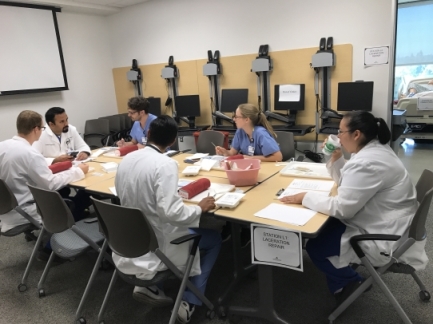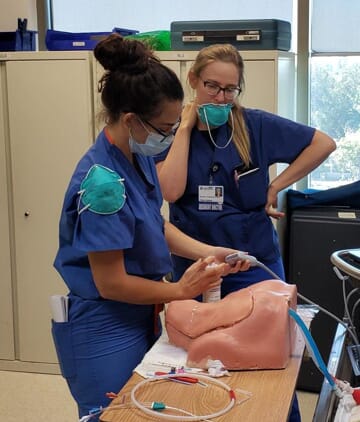Curriculum
The surgery program curriculum at Kaweah Health consists of five years of coordinated, progressive didactic and supervised clinical activities designed to prepare the trainees to assume gradually higher responsibility and autonomy in the care of surgical patients, and ultimately enter the unsupervised practice of surgery.

Didactic activities

The following core didactic activities take place at the program's primary site within a scheduled weekly 4-hour block of time protected from clinical assignments:
- Grand Rounds
- Practice Based Learning and Improvement conference
- Basic science and clinical curriculum session
- Supervised simulation and skills lab session
- Journal club meetings
Additional rotation-specific didactic activities at the primary site, such as Tumor board, Trauma and Vascular conferences, may occur outside the protected time block. During off-site rotations, residents attend the didactic activities available at that site.
Dedicated didactic skill sessions, such as the ATLS course and a cadaver lab, are offered during the course of the academic year.
Self-study programs based on online curricula and ad-hoc didactic sessions or workshop address specific areas such as clinical research, fatigue mitigation, patient safety, quality and performance improvement, communication and teaching skills, professionalism, and cultural sensitivity.
Kaweah Health Surgery program faculty and residents can access the current didactic schedule on the password-protected New Innovations website (https://www.new-innov.com/Login/Login.aspx). A live calendar of the current academic year conference schedule is also available here.

Clinical activities
The vast majority of the clinical experience takes place at the program's primary site. Specific off-site rotations are arranged with the appropriate sites to give the residents exposure to content areas in which it is anticipated that the program's main site may not provide an adequate experience, such as pediatric surgery, transplantation, burns, and complex surgical oncology, hepato-biliary and pancreatic surgery. Housing is provided by the program at all the off-site rotations. Nearly all the rotations include inpatient and outpatient assignments.
The clinical assignments of the first two years of residency are designed to provide the trainees with a balanced exposure to all content areas of surgery. Specific rotations in surgical critical care, transplant and endoscopy offer clinical and didactic activities aimed at achieving the competency expected of a general surgeon in those areas.
During the subsequent three years of training, the residents gain progressively increasing knowledge and patient care skills in the following essential content areas of surgery:
- Alimentary tract
- Abdomen and its contents
- Breast, skin, and soft tissue
- Head and neck, including trauma, vascular, endocrine, congenital and oncologic disorders -- particularly tumors of the skin, salivary glands, thyroid, parathyroid, and the oral cavity.
- Vascular system, excluding the intracranial vessels and heart.
- Endocrine system, including thyroid, parathyroid, adrenal and endocrine pancreas.
- Surgical oncology, including coordinated multimodality management of the cancer patient by screening, surveillance, surgical adjunctive therapy, rehabilitation, and follow-up.
- Comprehensive management of trauma, including musculoskeletal, hand, and head injuries.
- Complete care of critically ill patients with underlying surgical conditions, in the emergency room, intensive care unit and trauma/burn units.
Primary and integrated site rotations include General Surgery, Acute Care and Trauma Surgery, Vascular Surgery, Critical Care and Surgical Endoscopy. Off-site assignments include Burn, Hepato-biliary-pancreatic and Transplant Surgery rotations at University of California, Irvine, and a Pediatric Surgery rotation at Valley Children Hospital in Madera.
Subject to Kaweah Health program director's approval, a four-week block during the fourth year of training is available for elective rotations at a site of the resident’s choice. Recently approved elective off-site rotations include Vascular Surgery, Minimally Invasive Surgery, and Surgical Oncology.
Kaweah Health Surgery program faculty and residents can access the current block schedule and the incremental goals and competency-based objectives of every rotation for each year of training on the password-protected New Innovations website (https://www.new-innov.com/Login/Login.aspx).
